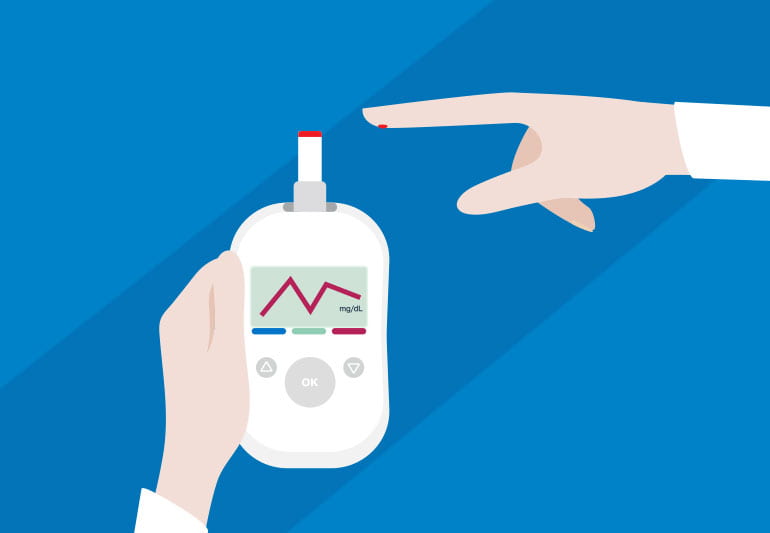
What is blood sugar?
Blood sugar can also be called blood glucose. Sugar and glucose can be interchangeable in this situation because glucose is the main sugar that carbohydrates and protein from our diet are broken down into. There are a few exceptions, however, we will not detail them for simplicity.
The measurement of blood sugar is the measurement of glucose in the bloodstream that the blood is transporting at any given moment. Blood glucose levels change throughout the day. After eating the levels rise, and they settle after about an hour. They are at their lowest point before the first meal of the day, due to the “fasted” period you went through while sleeping.
The human body regulates blood glucose levels so that they remain moderately constant and stable. This occurs through complex processes involving the small intestine, liver, pancreas, and even fat tissues. This is important to support vital bodily functions.
Much of this is done through the act of two key hormones: insulin and glucagon. After a meal, glucose enters the bloodstream from the breakdown of the diet as we mentioned above. The endocrine recognizes this signal and releases insulin to take up the glucose enough to fuel the cells. However, it is careful to not overload the bloodstream with too much and sends excess to the liver and muscles to be stored as glycogen. When the body needs more sugar in the blood, glucagon signals the liver to turn glycogen storage (stored glucose) back into glucose and release it into the bloodstream.
What is the importance?
Maintaining normal blood sugar levels is a very important part of avoiding long-term health issues, managing weight and just overall feeling good and energetic. Unhealthy blood sugar levels are actually becoming an epidemic proportion with the overeating habits of many.
The persistently high blood sugar level is a condition known as “hyperglycemia.” This acts when the insulin is not properly taking up the glucose for cells. If not properly controlled, it will inevitably lead to a plethora of health issues. This is the case in diabetes for example. At first it can leave you feeling hungry because your cells are not receiving the glucose they need to function properly. And I am sure you can guess what happens next…. We eat more. But if insulin isn’t working properly these calories continue to not go anywhere to be utilized for energy, rather they wreak havoc on our bodies in many ways:
- The excess is stored as fat.
- Excessive thirst due to the kidney trying to flush the excess sugar out of your blood. The resulting dehydration can adversely affect your concentration, blood pressure and kidneys.
- The biggest and most important symptom is a severe lack of energy. The mitochondria (or the powerhouses of our cells as you may remember from high school biology) will not be producing the body’s energy currency of ATP as it should be.
- Through a series of reactions, oxidative stress in the body will become a major contributor to the risk of developing a raft of serious cardiovascular conditions, neurological disorders and potentially life-threatening metabolic problems.
Good for you, because it is usually possible to normalize blood sugar levels before it is too late. Simple acts of modifying your diet, increasing activity levels, and possible supplementation such as Terry Naturally Blood Balance can go a long way. Ensure you are additioning greens such as kale and spinach into your diet along with whole grain fiber foods, berries, a little bit of healthy fats, and good portions of proteins.